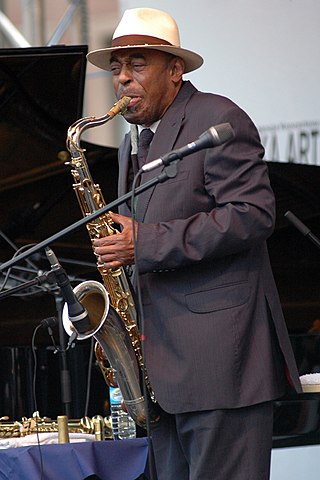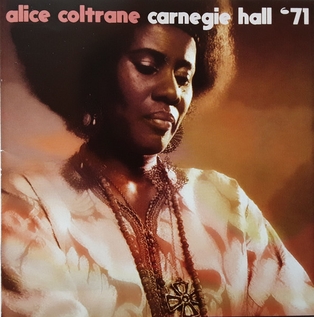Related Research Articles

Archie Shepp is an American jazz saxophonist, educator and playwright who since the 1960s has played a central part in the development of avant-garde jazz.

James Emory Garrison was an American jazz double bassist. He is best remembered for his association with John Coltrane from 1961 to 1967.
Clifford Osbourne Jarvis was an American hard bop and free jazz drummer, who in the 1980s moved to London, England, where he spent the remainder of his career.

Cecil McBee is an American jazz bassist. He has recorded as a leader only a handful of times since the 1970s, but has contributed as a sideman to a number of jazz albums.

Herman Davis "Dave" Burrell is an American jazz pianist. He has played with many jazz musicians including Archie Shepp, Pharoah Sanders, Marion Brown and David Murray.

Marion Brown was an American jazz alto saxophonist, composer, writer, visual artist, and ethnomusicologist. He was a member of the avant-garde jazz scene in New York City during the 1960s, playing alongside musicians such as John Coltrane, Archie Shepp, and John Tchicai. He performed on Coltrane's landmark 1965 album Ascension. AllMusic reviewer Scott Yanow described him as "one of the brightest and most lyrical voices of the 1960s avant-garde."
Ahmed Abdullah is an American jazz trumpeter who was a prominent member of Sun Ra's band.
Ronald Boykins was a jazz bassist and is best known for his work with pianist/bandleader Sun Ra, although he had played with such disparate musicians as Muddy Waters, Johnny Griffin, and Jimmy Witherspoon prior to joining Sun Ra's Arkestra.

Ascension is a jazz album by John Coltrane recorded in June 1965 and released in 1966. It is considered a watershed in Coltrane's work, with the albums recorded before it being more conventional in structure and the albums recorded after it being looser, free jazz inspired works. In addition, it signaled Coltrane's interest in moving away from the quartet format. AllMusic called it "the single recording that placed John Coltrane firmly into the avant-garde".

Featuring Pharoah Sanders and Black Harold is a jazz album by Sun Ra, recorded live on December 31, 1964, but not released until 1976, on Ra and Alton Abraham's El Saturn label. An expanded version of the album was reissued in 2009 by ESP-Disk, and again in 2017 by Superior Viaduct. A complete version of Sun Ra's performances on December 30 and 31, 1964 were released in 2012 on the Pharoah Sanders album In The Beginning 1963-1964.
Norris Jones, better known as Sirone was an American jazz bassist, trombonist, and composer.

Other Planes of There is an album by the American Jazz musician Sun Ra and his Solar Arkestra. Recorded in 1964, the album had been released by 1966 on Sun Ra's own Saturn label. The record was reissued on compact disc by Evidence in 1992.
'Granted, the selection is certainly not as abrasive and demanding as later efforts, although there is strident involvement from everyone within the dense arrangement. The brass and reed sections provide emphasis behind an off-kilter and loping waltz backdrop. All the more impressive is how well the material has held up over the decades. Even to seasoned ears, the music is pungent and uninhibited, making Other Planes of There a highly recommended collection.' Lindsay Planer
In the late 1960s, Latin jazz, combining rhythms from African and Latin American countries, often played on instruments such as conga, timbale, güiro, and claves, with jazz and classical harmonies played on typical jazz instruments broke through. There are two main varieties: Afro-Cuban jazz was played in the US right after the bebop period, while Brazilian jazz became more popular in the 1960s. Afro-Cuban jazz began as a movement in the mid-1950s as bebop musicians such as Dizzy Gillespie and Billy Taylor started Afro-Cuban bands influenced by such Cuban and Puerto Rican musicians as Xavier Cugat, Tito Puente, and Arturo Sandoval. Brazilian jazz such as bossa nova is derived from samba, with influences from jazz and other 20th-century classical and popular music styles. Bossa is generally moderately paced, with melodies sung in Portuguese or English. The style was pioneered by Brazilians João Gilberto and Antônio Carlos Jobim. The related term jazz-samba describes an adaptation of bossa nova compositions to the jazz idiom by American performers such as Stan Getz and Charlie Byrd.
Archie Shepp discography.
Dewey Bernard Johnson was an American free jazz trumpeter best known for his appearance on John Coltrane's historic recording Ascension.

Pharoah's First is the debut album by American free jazz saxophonist Pharoah Sanders, recorded in New York City at the loft of audio engineer Jerry Newman on September 10, 1964, and first released in 1965 on the ESP-Disk label. The album was originally issued with the title Pharaoh and was later re-released with the titles Pharoah,Pharaoh Sanders Quintet, Pharoah Sanders Quintet, and Pharaoh's First, and was also included in its entirety in the 2012 4-CD compilation In The Beginning 1963-1964.

The New Wave in Jazz is a live album recorded on March 28, 1965 at the Village Gate in New York City. It features groups led by major avant-garde jazz artists performing at a concert for the benefit of The Black Arts Repertory Theater/School founded by Amiri Baraka, then known as LeRoi Jones. The album was released on LP in 1965 on the Impulse! label, and was reissued on CD in 1994 with a different track listing.

Carnegie Hall '71 is a live album by Alice Coltrane. It was recorded at Carnegie Hall in New York City on February 21, 1971, and was released in 2018 by the Hi Hat label. On the album, Coltrane appears on piano and harp, and is joined by saxophonists Pharoah Sanders and Archie Shepp, bassists Jimmy Garrison and Cecil McBee, and drummers Ed Blackwell and Clifford Jarvis.

Melodic Art–Tet is a live album by the cooperative group of the same name, featuring saxophonist Charles Brackeen, trumpeter Ahmed Abdullah, bassist William Parker, drummer Roger Blank, and percussionist Tony Waters. It was recorded on October 15, 1974, at WKCR studios in New York City, and was issued by NoBusiness Records in 2013, nearly 40 years after the concert.

The Will Come, Is Now is an album by bassist Ronnie Boykins, his sole release as a leader. It was recorded during February 1974, and was released on LP in 1975 by ESP-Disk. On the album, Boykins is joined by multi-instrumentalists Joe Ferguson and Jimmy Vass, saxophonist Monty Waters, trombonist Daoud Haroom, and percussionists Art Lewis and George Avaloz. Saxophonist Marzette Watts was the recording engineer.
References
- ↑ "The New Grove Dictionary of Jazz". Oxford Music Online. Retrieved 2020-11-30.
- ↑ Wynn, Ron. "John Coltrane / Archie Shepp: The New Wave in Jazz". allmusic.com. Retrieved October 20, 2020.
- ↑ "'The Forty-Year-Old Version' Creator Radha Blank on Seeing Herself and Missing Her Mother". Essence. Retrieved 2020-11-30.